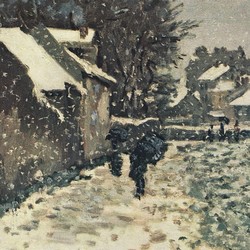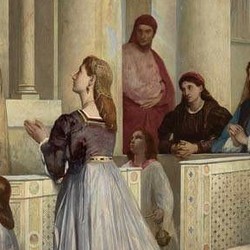- Details

"I’d say it’s the greatest British Art Song ever written." Sarah Connolly said this about King David on Twitter and I jotted down the song in my notebook. Her words referred to her concert with Julius Drake at the Teatro de la Zarzuela some days before; Unfortunately, I missed that, but I had already heard about how wonderful it was and also, about the encore, King David. And this is how this song overtakes another one from the same composer, Herbert Howells, which I've kept for a long time waiting for its moment to come.
- Details

We are in the middle of June and what we could call our "regular season" is about to finish; except for unforeseen events, July will belong to the students of the Master's Degree of Lied-ESMUC and, in August, I’ll focus on the Schubertíada, as I did in previous years. Once more, I have a few pending posts; Some of them will be moved to my next season's notebook (mental note: to buy the next season's notebook) and others will patiently wait to draw my attention again. But still two weeks to go, so let's get started with the first one. When I learned that Joyce DiDonato would sing Winterreise this summer in Vilabertran [...]
- Details

We have no pianist this week. Neither orchestra nor guitar nor harp nor other accompaniment. When I edit the article I will add only three of the four usual tags: composer, poet and singer; the accompanist tag will remain empty because this week we will have voice a cappella. As you know, it's very unusual; art song is sung with accompaniment. I would say that solo voice has to do with the most contemporary song, that composed in the last decades.
- Details

Trends come and go, tastes change and it can be said about many different things: fashion, food or (alas!) Lied. A good example of a Lied that one day was really fashionable and today is almost unknown is Lob der Tränen [Praise of tears]. It is believed that Franz Schubert composed it during the first half of 1818 and it was published in 1822; It belongs, therefore, to his few works (approximately one hundred) that were published while he was still alive.
- Details

Tre sonetti di Petrarca by Franz Liszt were published in 1846, first the solo piano version and a few months later, the songs, which are believed to be composed first. Liszt might have composed them a few years before, during his relationship with Countess Marie d'Agoult, the kind of stories that used to be a scandal at the time. In 1835, the countess, thirty-two years old, married and with two children, left her husband for the pianist, eight years younger than her. They left Paris and, between 1835 and 1839, they lived in Switzerland and Italy, where their three children were born; Liszt spent the following five years [...]












